Blog
Go backThe Fucking History of "Fuck": Tracing the Origins, Evolution and Endurance of English's Most Notorious Word
No-Filter Zone · June 25th, 2025
Few words in the English language are as simultaneously infamous, ubiquitous and oddly satisfying to utter as the word "fuck." This four-letter vulgarism has a unique distinction: it's considered one of the worst swear words, yet it's also among the most versatile and enduring. The mere sound of it – the fricative "f" rolling into that hard "-uck" – can function as a cathartic release, a bonding gesture or a verbal hand grenade. Psycholinguists even note that yelling "fuck" can physically boost strength and dull pain, as if the word carries its own power.
But where did this legendary profanity come from? How long have people been saying it (and writing it) and what did it originally mean? This irreverent but well-researched journey will delve into the linguistic and etymological roots of "fuck," from its shadowy medieval origins to its modern grammatical free-for-all. Along the way, we’ll bust some popular folk etymology myths (no, it’s not an acronym for anything) and compare “fuck” to its cousins in other languages. By the end, you’ll see that “fuck” is not a recent vulgar upstart, but a word with deep historical roots and surprising linguistic longevity – a true survivor in the lexicon of swearing.
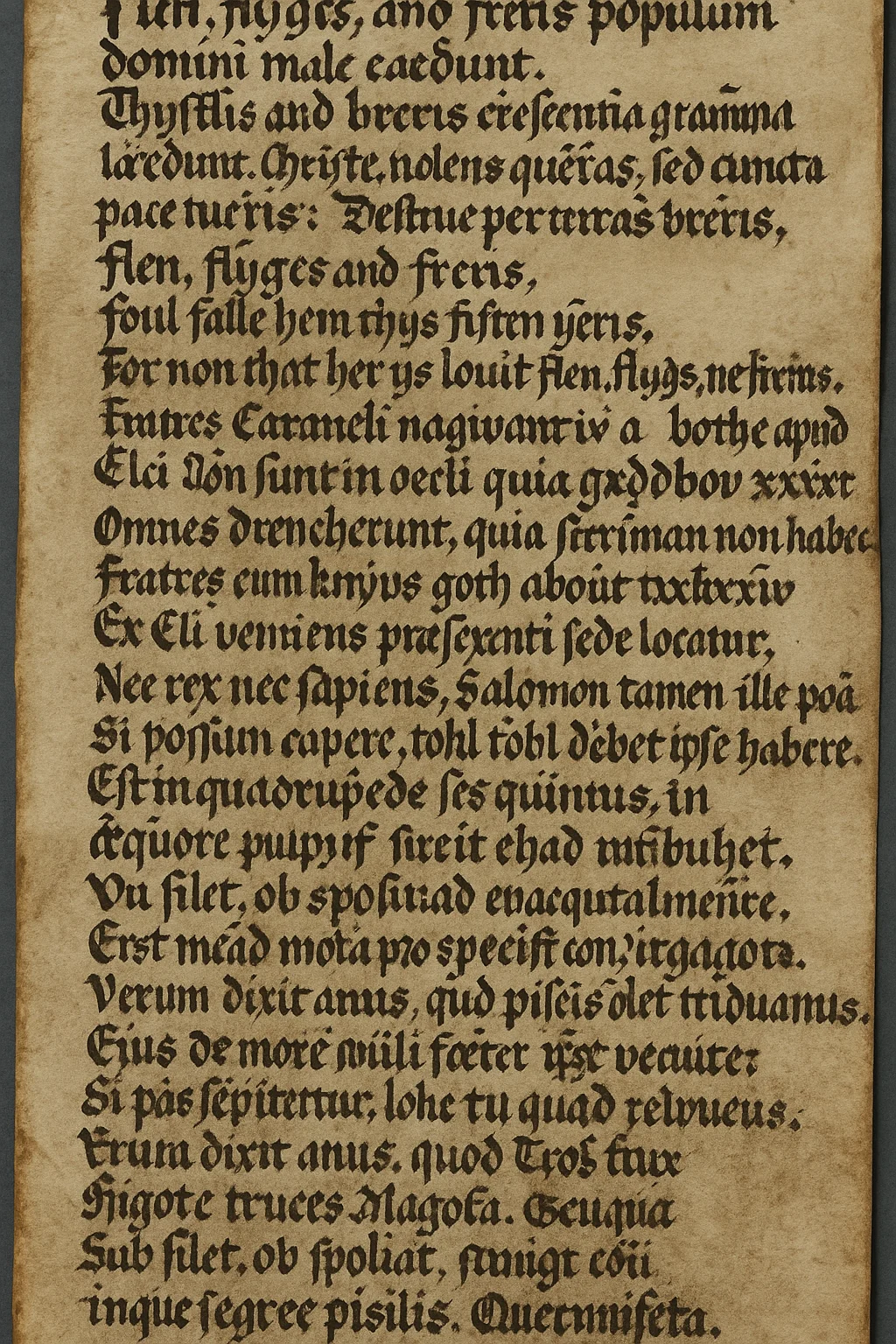 A page from the 15th-century poem "Flen flyys" containing one of the earliest coded references to the F-word in English literature.
A page from the 15th-century poem "Flen flyys" containing one of the earliest coded references to the F-word in English literature.
Medieval Origins: The Earliest Recorded F-Bombs
It may surprise some to learn that "fuck" is old. In fact, the word is so old that scholars have to sleuth through medieval manuscripts and dusty court records to catch its earliest appearances. For centuries, "fuck" was likely common in spoken English, but few dared put it in writing – which makes early written examples precious (and hilarious) finds.
The earliest clear reference to the word in English comes from the Middle Ages, hidden in coded form in a 15th-century poem. An anonymous satirical verse from around 1475 titled "Flen flyys" ("Fleas, Flies") contains a line that, once deciphered, drops the F-bomb on some lascivious monks. The line was originally written in a playful code: "Non sunt in coeli, quia gxddbov xxkxzt pg ifmk." When you replace each letter with the previous letter in the alphabet, it reveals a cheeky macaronic phrase: "Non sunt in coeli, quia fuccant uvivys of heli." In plain English, that means "They are not in heaven because they fuck the wives of Ely."
Yes, a medieval poet literally accused Cambridge friars of fornicating with local women and he encoded "fuccant" (a fake-Latin conjugation of an English root) to avoid openly writing the dirty word. This bawdy joke suggests that by the 1400s "fuck" was already risqué enough to require a cipher. It's uncertain whether medieval readers would have been as shocked as a modern audience – but the very need for code implies the F-word carried taboo weight even then.
 A recreation of the 1310 court record mentioning "Roger Fuckebythenavele" - possibly the earliest recorded instance of the F-word in English.
A recreation of the 1310 court record mentioning "Roger Fuckebythenavele" - possibly the earliest recorded instance of the F-word in English.
However, our story doesn't start (or end) in 1475. In recent years, historians have pushed back the timeline of "fuck" by finding even earlier instances – some clear, some debated. One of the earliest known uses appears in English records from 1310, albeit in a highly unusual context: a man's name. A Cheshire county court roll from that year repeatedly refers to a fugitive outlaw by the name of "Roger Fuckebythenavele."
This jaw-dropping surname (pardon the pun) was discovered by medieval historian Paul Booth, who believes it was likely a nickname meaning "Roger the navel-fucker". The unfortunate Roger was cited multiple times between 1310 and 1311 as authorities attempted to arrest him (apparently unsuccessfully, since he was ultimately declared an outlaw). The repetition of the name across several entries shows it wasn't just a one-off joke by a scribe – it was his actual recorded nickname.
What could inspire such a moniker? Booth offers two interpretations, both richly obscene: either Roger had a clueless youthful attempt at copulation "through the navel" (suggesting gross sexual ineptitude) or the term was figurative slang for an idiot – essentially calling Roger a dimwit "who'd think that's how sex works". There's even a third possibility that it referred to an act of "frottage" – rubbing against the belly to avoid actual conception. In any case, Booth is convinced this "fuck" in Roger's nickname carries a sexual meaning, not a non-literal one. If so, it predates the coded Flen flyys usage by 165 years, marking 1310–1311 as the new (possible) birthdate of written "fuck."
Even Earlier Hints of the F-Word
- A 1278 court record mentions a man dubbed "John le Fucker" - though linguists caution this might derive from "Fulcher" (meaning soldier) rather than anything rude. In other words, John le Fucker might sadly have just been John the Knight, not John the copulator. Supporting this, no one has actually located the original source for this name in 1278 , so it remains an intriguing footnote – possibly a false alarm.
- A 1287 record from Sherwood Forest (yes, Robin Hood’s turf) cites men named "Ric Wyndfuk" and "Ric Wyndfuck de Wodehous" - possibly referring to a kestrel (known as a "windfucker" for hovering in the wind). If windfucker is related to “fuck,” it would be an example of the word used in a non-sexual sense (perhaps meaning to strike or beat the wind or simply describing the bird’s motion).
- The same Sherwood records list a "Fuckebegger" (1287), which appears to mean "strike-beater" - suggesting an earlier, action-oriented meaning of fuck ("to hit" rather than "to shag") - or they could be unrelated words entirely
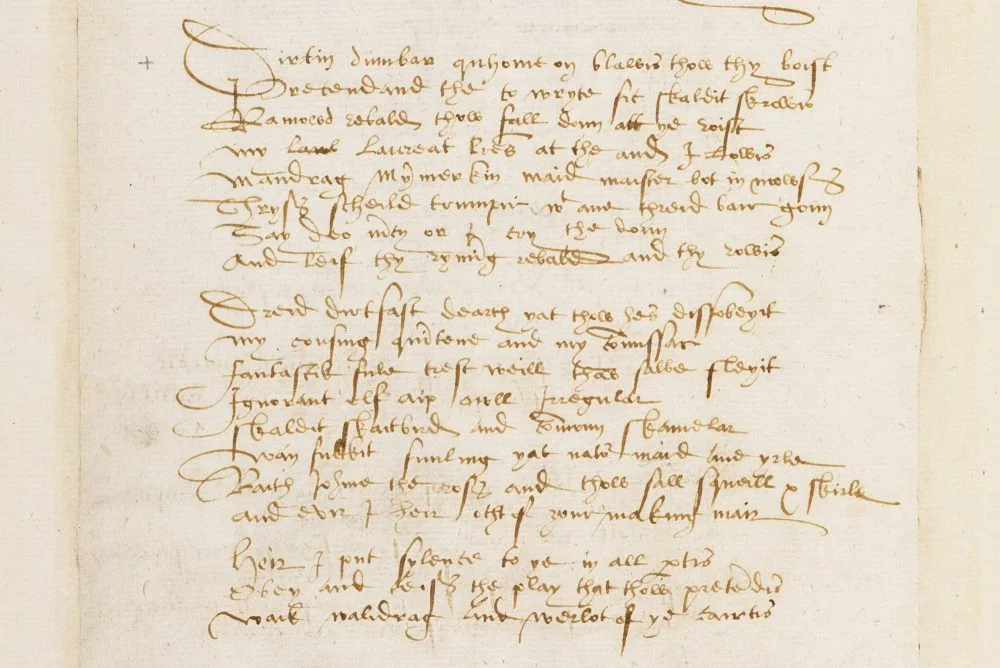 A page of the Bannatyne Manuscript (1568) containing the line "wan fukkit funling" – one of the earliest recorded uses of "fuck" (spelled fukkit) in literature. This Scottish anthology preserved a 1500s poets' "flyting" (verbal duel) full of creative insults.
A page of the Bannatyne Manuscript (1568) containing the line "wan fukkit funling" – one of the earliest recorded uses of "fuck" (spelled fukkit) in literature. This Scottish anthology preserved a 1500s poets' "flyting" (verbal duel) full of creative insults.
After the semi-coded 15th-century Flen flyys poem, the F-word pops up more overtly in the early 1500s – particularly in Scotland, which seems to have been way ahead of the curve in recording vulgar language (thank the lively tradition of Scots poets!). One famous instance comes from a poetic "flyting" – essentially a rap battle in verse – between William Dunbar and Walter Kennedy around 1500 at the court of King James IV. In this contest of creative insults, Kennedy zings Dunbar by calling him a "wan fukkit funling". In good Scots dialect, that means "weak/poor fucked foundling", implying Dunbar is a wretch who has been, well, thoroughly fucked (either literally or metaphorically ill-used).
This zinger, preserved in the 1568 Bannatyne Manuscript, is one of the earliest clear uses of "fuck" (spelled fukkit) in English/Scots literature. Amusingly, modern readers might not even catch the F-word in "wan fukkit funling" because it looks so odd – one commentator noted it hardly seems like English at first glance. That raises an interesting point: is this English or Scots? At the time, Scots was a distinct Anglic language closely related to Middle English. Whether you consider it a dialect or its own language, Scots definitely embraced "fuck" early. But as we'll see later, England can claim its own swearing pioneers, so Scotland doesn't get sole credit for inventing the word (they just weren't as shy about writing it down).
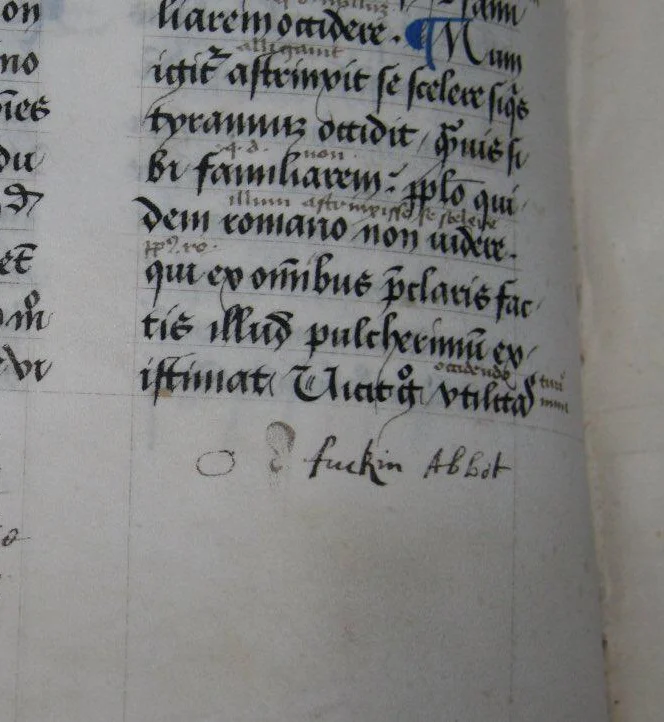 A recreation of the 1528 monk's annotation "O d fuckin Abbot" - the first known use of "fucking" as an adjective in English.
A recreation of the 1528 monk's annotation "O d fuckin Abbot" - the first known use of "fucking" as an adjective in English.
Meanwhile, back in England, a certain sassy monk was about to make lexicographic history. In the year 1528, a monk copying a Latin manuscript of Cicero's De Officiis apparently reached the end of his patience with a misbehaving abbot. In the margin, next to a note about the abbot's dubious work, this fed-up scribe scrawled: "O d fuckin Abbot." In plain terms, that's likely "O [damned] fucking abbot."
Congratulations, dear monk: you just wrote the first known adjectival "fucking" in the English language! This fiery little annotation sat quietly in the manuscript for centuries until modern scholars identified it as the earliest usage of "fucking" as we know it – possibly the first instance of someone using "fucking" to emphatically insult a person. Now, it's possible the monk meant it literally ("that abbot is literally fornicating too much"), accusing the abbot John Burton of breaking his vows of chastity. But it's equally possible he meant it as pure invective – the medieval Latin equivalent of "that damned fucking abbot!" said in frustration. If the latter, this monk was truly ahead of his time: using "fucking" as an intensifier wouldn't become common in print for another 300+ years. Either way, this margin note shows that by the 16th century, "fuck" had fully arrived in written English, albeit in private jottings rather than published works. Tellingly, the monk censored himself only on the "damned" (writing just 'O d') but not on "fuckin", as if eternal damnation was the bigger linguistic no-no than sexual slang. Priorities!
From the Renaissance to Victorian Times: Changing Usage and Spelling
By the late 16th century, the word "fuck" was sufficiently established (if still very impolite) to merit inclusion in a dictionary. In 1598, an Italian-English dictionary by John Florio – titled A Worlde of Wordes – famously listed the Italian verb fottere ("to copulate," itself a vulgar term) and gave a string of English equivalents: "to jape, to sard, to fucke, to swive, to occupy." There it is in black and white: fucke – sitting alongside other then-vulgar synonyms. (For context, jape meant to have sex, sard came from Old English seordān meaning to copulate, swive was an old term meaning "to swivel" that euphemistically meant sex and even occupy had a sexual overtone in those days.) It's delightful to imagine some Elizabethan scholar thumbing through Florio's dictionary and discovering that naughty little entry. In fact, occupy became so associated with carnal meaning that by the 18th century it was seldom used in polite writing. "Fuck," on the other hand, remained beyond the pale for most published texts – but not entirely absent.
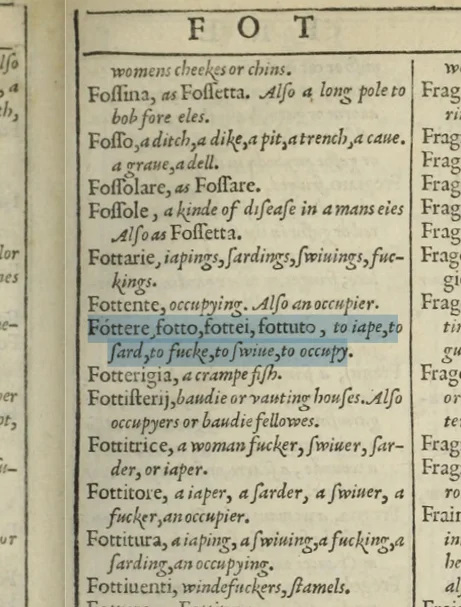 A recreation of John Florio's 1598 dictionary entry listing "to fucke" among English equivalents for the Italian "fottere".
A recreation of John Florio's 1598 dictionary entry listing "to fucke" among English equivalents for the Italian "fottere".
Moving into the 17th and 18th centuries, direct written uses of "fuck" were still uncommon (prudery was on the rise), but the word certainly didn't disappear from speech. It lingered in the margins – literally in margin notes or private writings – and in certain niche publications. One such niche was the world of slang dictionaries. In 1785, Captain Francis Grose published A Classical Dictionary of the Vulgar Tongue, a compendium of colorful slang. Did Grose include "fuck"? He included a lot of taboo terms (even "Ct," though later expurgated editions removed that one). It's likely "f–k" made an appearance, though often delicacy or fear of censors led writers to use dashes or euphemisms. For example, the phrase "I don't give a fuck" – today a very common vulgar idiom – first showed up in print in 1790 in a poem by St. George Tucker. There, it was coyly printed as "I'd not give -- for all you've read." Scholars agree the blanked-out word was "a fuck," making this the earliest record of that now-common expression. It seems our ancestors were already not giving a fuck long before the 20th century – they just couldn't quite spell it out.
By the Victorian era (19th century), "fuck" was fully entrenched as extremely taboo – arguably more taboo than in earlier centuries due to the era's prudish norms. Yet it still crept into writing in winks and nudges. An 1893 slang dictionary by Farmer and Henley acknowledges both the adverbial use of "fucking" (as in "blooming" or "bloody," but stronger) and the adjectival use (as an intense insult) – noting that fuck is like "bloody" but "more violent". Clearly, people were saying it often enough to compare its intensity to other swears. Linguist Geoffrey Hughes noted that by the mid-to-late 19th century, the modern usage of fuck was in place and fairly stable. In other words, by around 1850 or so, English speakers were using "fuck" in roughly the same ways we do today – as a blunt term for sex, as an expletive expressing anger and in various idiomatic curses – even if these uses were largely confined to spoken or lowbrow contexts, away from genteel print. The Victorian gentility might have acted shocked, but behind closed doors (or in pubs and barracks) the F-word was alive and kicking.
It wasn't until the 20th century that "fuck" really burst into public print with the force of a frag grenade – appearing in literature (e.g. Lady Chatterley's Lover in 1928 scandalously used it), in the courtroom (the obscenity trials of the 1960s) and eventually even on broadcast media. But those cultural battles are another story for another article (one on censorship and branding, perhaps). Our focus here is on the word's linguistic journey and by the time the 1900s rolled around, that journey had produced a fully-fledged, flexible swear word understood around the English-speaking world. In summary, fuck managed to survive and thrive through centuries when it was either hidden in code, scrawled in margins or excluded from "proper" writing – only to emerge as arguably the king of all curse words in modern times. Talk about linguistic endurance!
Germanic Roots: "Fuck" and its Family Across Languages
So where did this delightful word actually come from? Linguists assure us that "fuck" is a word of Germanic origin, not a recent acronym or import. In fact, it has siblings and cousins in many Germanic languages, indicating it likely hails from a common ancestor word way back in the misty centuries of early medieval Europe. The Oxford English Dictionary (OED) traces it to either an unattested Old English word or more probably to Middle Dutch or Low German sources. Let's meet the Fuck Family:
The "Fuck" Family Across Germanic Languages
- In German, the verb ficken has meant "to have sex" (vulgar) for many centuries. It's pronounced with a short "i" (closer to "fick-en"), but clearly akin to "fuck." Interestingly, in older German, ficken could also mean "to rub" or "to strike," not just sexual intercourse.
- In Dutch, there's fokken, which today commonly means "to breed (animals)" or by extension "to breed or beget children". Centuries ago it also carried meanings of hitting or poking and likely sexual ones too. Afrikaans, derived from Dutch, similarly has fok for "have sex" (and as a general swear).
- Old Scandinavian dialects give us forms like dialectal Norwegian fukka ("to copulate") and dialectal Swedish focka ("to strike" or "to copulate"), with fock even meaning "penis" in one Swedish dialect. Icelandic has fokka, used more innocuously as "to mess around" or rush, but you can see the resemblance.
- Closer to home, Old English itself doesn't give us a clear ancestor (no fūcan or fuccian is recorded), but there was the word fuccant in that 1475 poem which hints that some form existed orally. Some scholars think English fuck might have been a later borrowing from, say, the Middle Dutch fokken during the late medieval period, rather than a direct carryover from Anglo-Saxon.
The heavy Norse influence on northern English and Scots dialects has led to speculation that fuck could have been reinforced or introduced by Vikings (Old Norse had the word fukka meaning "to copulate," very close to modern usage). Indeed, Scots' early and abundant use of "fuck" might reflect Norse input in Scotland. But since we have "Roger Fuckebythenavele" and others down in England in the 14th century, English can claim it locally too. Most likely, all these Germanic tongues inherited or shared a similar root concept.
So, is there an ultimate Proto-Germanic or even Proto-Indo-European root for this? Possibly, but it's tricky. The OED and others suggest a link to a Proto-Germanic verb *fuk(k)on (hypothetical) meaning "to strike, rub or have sex". This in turn might come from an Indo-European root *peuk- or *peug- meaning "to strike or stab." In support, they point to Latin words like pugnus (fist) and pugno (I fight) which come from a root meaning "to prick, punch or fight". If you apply Grimm's Law (which explains sound changes from Indo-European to Germanic), a PIE *p sounds like f in Germanic and *k might align with a Germanic k. So *peuk- could, in theory, yield a Germanic fuk-. The idea is that the original sense was hitting or moving back and forth – something physical – which later took on the meaning of the physical act of love (or at least physical act of something!). As one slang etymologist put it, "fuck" almost certainly comes from a root meaning "to prick, punch or penetrate." That would certainly fit the sexual context.
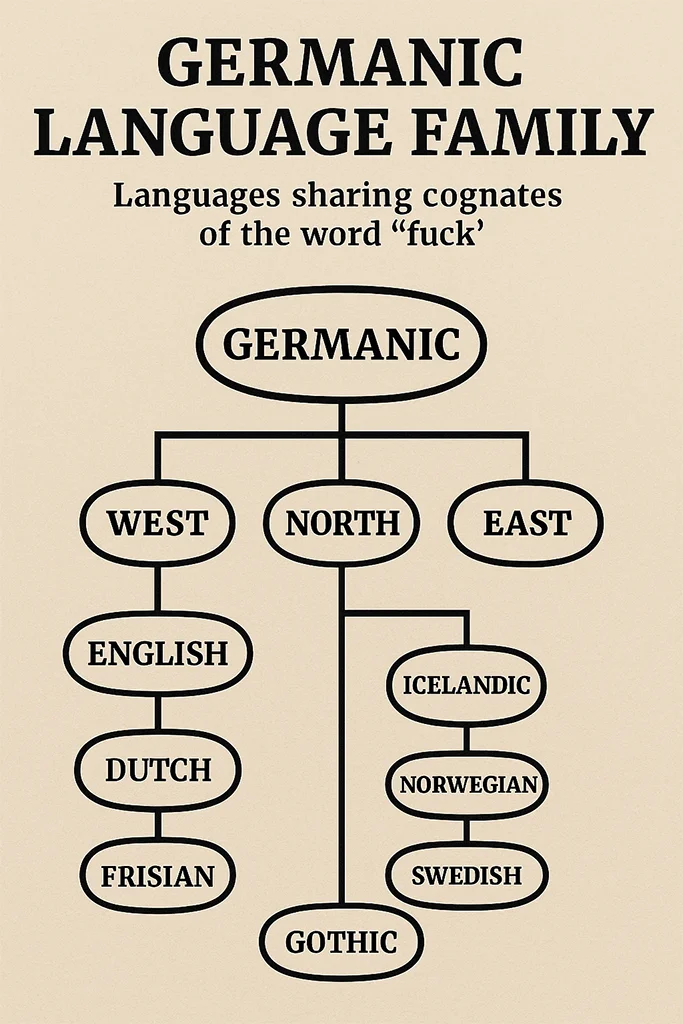 A simplified Germanic language family tree showing the relationship between languages that share cognates of the word "fuck".
A simplified Germanic language family tree showing the relationship between languages that share cognates of the word "fuck".
However, we should note a couple of caveats that linguists raise. First, outside the Germanic languages, none of the supposed cognates (Latin, etc.) carry a sexual meaning – pugnus = fist, not exactly sexy. That suggests that the sexual sense of this root developed within Germanic culture specifically. Second, there's some weirdness with vowels: for example, German ficken has a different vowel (i) than Dutch fokken (o) or the English u in fuck, which complicates deriving them all from one neat proto-word. Some think perhaps we're looking at a regional North Sea slang that spread around medieval England/Scandinavia, rather than an unbroken line from ancient Proto-Indo-European. But at the end of the day, all these words sound related and act related, so we can comfortably call them cognates – they likely came from a common source or influenced each other over time.
Importantly, "fuck" has no known connection to Latin futuere or French foutre, despite surface resemblances. Latin futuere (to have sexual intercourse with) is indeed the ancestor of French foutre, Italian fottere (as in Florio's entry), Spanish follar, etc. It looks a bit like "fuck" and means the same thing, so you'd think maybe English borrowed it from French after the Norman Conquest. But etymologists say "almost certainly not." The Latin/Latinate words come from a completely different root (likely from futu-, possibly related to fundere, "to pour out," or some obscure origin – Latin scholars aren't 100% either). The lack of a clear trail from Old French to Middle English for this word, plus the strong presence of a Germanic alternative, means English "fuck" probably grew from Germanic roots independently. So don't credit the French for this one – it seems we came up with it (and our Germanic cousins too) all on our own.
Debunking the Folk Etymologies: It's NOT an Acronym
No discussion of the word "fuck" would be complete without addressing the colorful urban legends that have sprung up about its origin. Perhaps because people are uneasy about profanity, they love inventing clever backronyms and stories to explain the F-word. Let's make this crystal clear: "Fuck" is NOT an acronym for anything. All those stories you heard are fucking false. Here are a few persistent myths that need a good debunking:
- "Fornication Under Consent of King" – According to this tall tale, in the Middle Ages a town had to get the king's permission to repopulate after the Black Death, so couples would be granted a royal license to procreate with a sign reading "F.U.C.K." ("Fornication Under Consent of King"). It's a fun story – and utterly unsubstantiated. No record of any such practice or sign exists. (Also, medieval folks weren't shy about making babies; they didn't need Kingly signboards to encourage it.)
- "For Unlawful Carnal Knowledge (in the Nude)" – A similar myth claims that in olden days adulterers were put in stocks with a sign reading "FUCKIN" above them, short for "For Unlawful Carnal Knowledge In the Nude." Creative, but again, no historical records support this phrase ever being used. It's an obvious acronym back-formation – someone in modern times thought it'd be cool if "fuck" secretly stood for a punitive phrase. Alas, it doesn't.
- The Plucky Archers: "Pluck Yew" turned to "Fuck You" – This one, popularized in modern media (even an American radio show Car Talk joked about it), holds that English longbowmen captured by the French had their middle fingers cut off (so they couldn't pluck the yew bowstring). Victorious archers would wave their two-fingered salute and yell "We can still pluck yew!" which supposedly morphed into "fuck you." It's a load of bollocks historically. The whole finger-cutting story is dubious and adding an F-word twist is pure embellishment. English bowmen probably did taunt the French at Agincourt, but not in those words!
 Renaissance romance - no kingly permission slip required.
Renaissance romance - no kingly permission slip required.
In short, "fuck" wasn't born from any polite or technical phrase – it was always a blunt word for a blunt concept. The straightforward Germanic etymology we explored is the real deal, even if it's less amusing than kings and acronyms. It's telling that the myths usually try to sanitize or legitimize the word (tying it to law, history, etc.), when in reality fuck has always been a bit of a linguistic outlaw. As one scholar wryly put it, these acronym claims are "at best a so-called 'backronym'" – an invented explanation long after the fact. So if you hear anyone confidently asserting one of these origins, you have my full permission to (figuratively) strike them down with the truth.
The Sound and Fury: Why "Fuck" Feels So Good to Say
Linguists and casual swearers alike often comment on the visceral sound of the word "fuck." It's monosyllabic, starts and ends abruptly and tends to explode out of the mouth with a force that softer curses (like "darn" or "shoot") just don't have. The word lands like a punch – which makes sense given its likely origin meaning "to strike." There is a kind of perverse beauty in its phonetics. As one writer observed, "it just feels good to say. It feels good in the mouth, giving shape to catharsis... satisfying a strong emotional need." Unlike many longer or more polite words, "fuck" has a plosive final consonant [k] that you can really hit hard, adding to the sense of release when cursing. You can whisper "fuuuuck" or shout "FUCK!" and in both cases that K is like a verbal exclamation point.
 From fricative hiss to plosive punch - she’s DIY-demoing the full ‘f...uck’ airflow arc.
From fricative hiss to plosive punch - she’s DIY-demoing the full ‘f...uck’ airflow arc.
Interestingly, there's even a (semi-serious) scientific hypothesis about the F-word's emergence related to human anatomy. A 2019 article in the journal Science suggested that when humans transitioned to softer diets with agriculture, the alignment of our teeth changed (we developed an overbite) which made it easier to produce certain sounds like "f" and "v." Before that, those sounds were rarer across languages. So as one humorist summarized: an overbite "cleared the way for words like 'fuck'." In other words, once we could easily say "f," perhaps we inevitably invented "fuck"! While this is a tongue-in-cheek take on linguistic evolution, it highlights that the F-sound is relatively rare in the oldest Indo-European languages (Latin used "p" for similar roots, for example). English is actually pretty fond of the "f" sound and fuck is our star player with that sound.
From a linguistic perspective, "fuck" fits into a broader pattern of English words: the f- + short vowel + -k/t pattern. Think of words like flick, flicker, flip, flit, fiddle, fidget, fork, frisk. Many of these have a sense of quick movement or agitation. "Fuck" with its original sense of moving back and forth vigorously (we'll let your imagination fill in the specifics) slots right in. It's almost as if there was a template in our language for punchy little f-words and "fuck" just happened to become the most taboo of them. Even an archaic word like "frig" (to frig was an old slang for masturbating or messing around) follows this pattern. So phonetically and structurally, fuck isn't an outlier – it's tapping into some of the most fundamental sounds of English to get its point across.
 Graffiti on an abandoned tank in Culebra, Puerto Rico spells out "WTF?" – a slang acronym for "What The Fuck." Even in casual tags, fuck finds its way into our language, showing how entrenched it is in modern expression.
Graffiti on an abandoned tank in Culebra, Puerto Rico spells out "WTF?" – a slang acronym for "What The Fuck." Even in casual tags, fuck finds its way into our language, showing how entrenched it is in modern expression.
Another aspect of "fuck"'s sound that makes it potent is stress. In English intonation, a one-syllable word ending in a stop consonant can really carry stress and emphasis well. And if one syllable isn't enough, English speakers got creative: we started inserting "fucking" in the middle of other words for extra oomph! This is called expletive infixation. For example, "fan-fucking-tastic" or the classic "abso-fucking-lutely." Because of how English stress patterns work, certain insertions sound natural (in-fucking-credible works, whereas incredi-fuckin-ble does not). The rule of thumb is you stick "fucking" before the syllable that has the primary stress in a word (so, INcredible becomes in-FUCKING-credible, absolutely becomes abso-FUCKING-lutely, etc.). This playful use shows how comfortable we've become with the phonetics of "fuck" – we treat it almost like a prefix or a piece of word-building we can snap into place. Linguists love this example because it's a clear case of a profanity interacting with the nuts and bolts of language structure (stress, morphology) in a rule-governed way. Even when we break the rules with "fuck," we're following rules! And admit it: saying "un-fucking-believable" at just the right moment is unbelievably satisfying.
Finally, let's not forget the simple emotional weight the word carries. Swear words activate emotional and pain centers in the brain more than neutral words do. "Fuck" in particular has punch. It's often cited in studies of swearing as one of the most cathartic expletives, useful for pain relief (yell it when you stub your toe) and for bonding (friends peppering conversation with it casually). One could argue that centuries of taboo have only enhanced its impact – it has that transgressive thrill. Yet interestingly, as it becomes more common and less strictly taboo than, say, 50 years ago, it hasn't really lost its core punch among peers. People might say it more, but they still feel it. We'll discuss its adaptability next, but in terms of sound and psychological effect, "fuck" stands supreme. It manages to be both the go-to vulgar intensifier and still a word that can shock (just ask your local TV censors, who often still bleep it). That's a tricky balance and "fuck" rides the line.
The Ultimate Grammatical Multitool: Fuck as Noun, Verb, Adjective... and More
One reason "fuck" is often crowned the champion of curse words is its grammatical versatility. As a popular internet meme once demonstrated in a mock dialogue, you can practically replace every word in a sentence with "fuck" and, through tone and inflection, still communicate meaning. Comedian Lewis Black showcased this with a tongue-in-cheek sentence: "Fuck fucking fucked fucker fucking fuckups fuck fucking fucked fucking fuckup fucking fucker's fucking fuckup." Believe it or not, that string of F-words, chaotic as it looks, can be parsed by the English-speaking brain (especially one well-versed in swearing) into a coherent statement with subjects, verbs, adjectives, etc. While we don't recommend trying that in a formal essay, it underscores a point: "fuck" is a shape-shifter.
"Fuck" as Every Part of Speech
- Verb (transitive): "Alice fucked Bob"
- Verb (intransitive): "They were fucking all night"
- Noun: "I don't give a fuck," "He's a dumb fuck"
- Adjective: "Where's my fuckin' keys?"
- Adverb: "They fucking cheated me over"
- Interjection: "Fuck! That hurts."
- Conjunction/Filler: "It was late and fuck if I knew where to go"
- Pronoun (jokingly): "Hand me that fucker, will ya?" (where fucker stands in for an object)
In formal terms, fuck can fill any part of speech. As the Oxford English Dictionary notes, there are indeed documented uses of "fuck" as virtually every part of speech, pronoun included. Few, if any, English words can claim such a range. It's like the Swiss Army knife of words – crude, but incredibly adaptable.
Then there are the derivatives and compounds. Add "-er" and you get fucker, a noun (which can be an insult or even a rough term of endearment depending on context, e.g. "you lucky fucker"). Add "-ing" and you have fucking, which as we've seen can be a verb, adjective or noun (in gerund form, "the fucking was great"). You can slap fucking in the middle of other words (as discussed with infixation) or at the start of phrases for emphasis ("fucking great idea!"). English speakers have tacked "fuck" onto countless other words to create compounds: motherfucker, fuckface, fuckwit, clusterfuck, fuckboy and on and on.
There's a perverse creativity to it. By the 20th century, we even see acronyms incorporating it, like the military slang SNAFU ("Situation Normal: All Fucked Up") and FUBAR ("Fucked Up Beyond All Recognition"), both dating to World War II. These arose because soldiers found fuck to be the most emphatic way to describe a messed-up situation – standard language just didn't cut it.
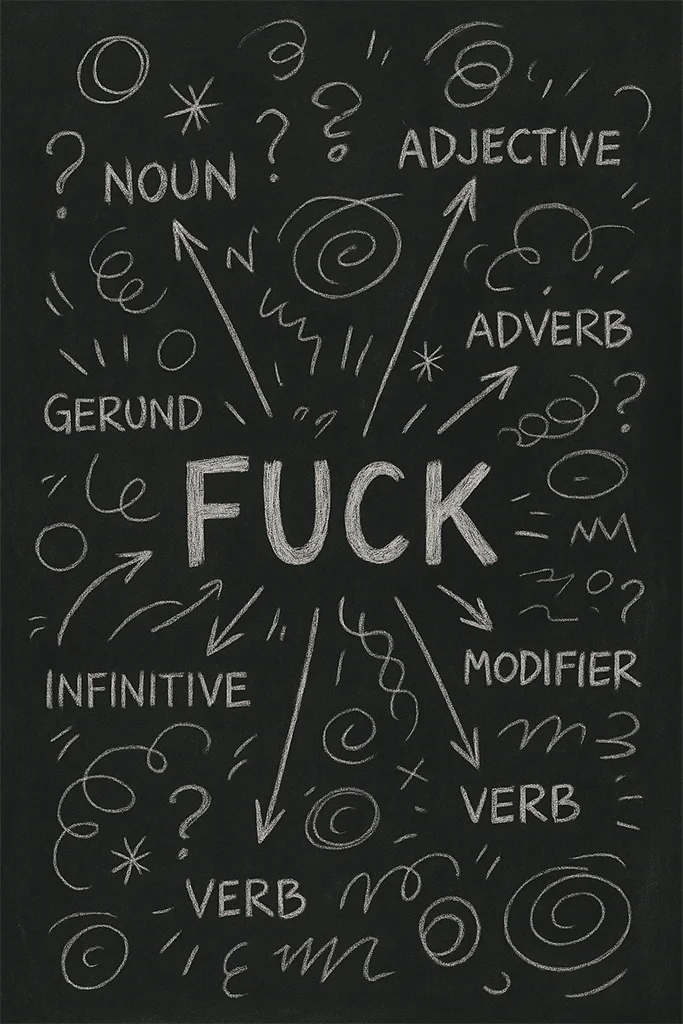 A diagram illustrating the grammatical versatility of "fuck" - one of the few English words that can function as virtually any part of speech.
A diagram illustrating the grammatical versatility of "fuck" - one of the few English words that can function as virtually any part of speech.
Grammatically, one of the most fascinating uses is "fuck" as an infix (mentioned earlier). This is relatively rare in English – we don't usually stick whole words inside other words – but "fucking" is the classic example. As an intensifier, "fucking" can also attach as a prefix or suffix (e.g. "fucking awesome," "crazy fucker"). Unlike many intensifiers that weaken over time (think "very"), "fucking" has stayed strong due to its taboo aura. Even people who might not otherwise curse will admit there's a special expressive power to saying something is "fucking [adjective]" versus just "really [adjective]."
From a grammar standpoint, you might wonder: how can one little word be so many things? The answer lies in context and stress. Tone and position in the sentence do a lot of work. For instance:
- Verb: "to fuck" – It carries the main verb slot (with conjugations like fucked, fucking).
- Noun: "a fuck" – Often needs an article or quantifier ("give a fuck," "not a single fuck was given").
- Adjective: Comes before a noun, usually as "fucking [noun]".
- Adverb: Often placed before another verb or adjective ("fucking killed it", "fucking stupid").
- Interjection: Standalone, often with an exclamation.
- Conjunction: In colloquial speech, sometimes "and fuck..." or "but fuck..." slips out as a discourse connector (more like a filler indicating frustration).
The fact that our brains can so easily parse these on the fly shows how entrenched the word is in our linguistic circuitry. We subconsciously know the difference when a friend says "you fucker" (noun, a mild teasing insult perhaps) vs "you fucked up" (verb, you made a mistake) vs "that is fucking beautiful" (adverb intensifier, surprisingly positive). Some languages have multiple distinct words where we have this one multitasker. It's quite efficient, really!
It's worth noting that "fuck" hasn't always held all these grammatical roles uniformly through time. The core use was as a verb (literally "to copulate"). The use as a noun (meaning "sex" or "person who is having sex / despicable person") came somewhat later. Adjectival and adverbial uses (the intensifier "fucking amazing" or the extended "fucking hell") really blossomed in the modern era, especially as the word became more common in everyday speech by the mid-20th century. But once the floodgates opened, "fuck" filled every niche available. By the 21st century, linguists catalogued over 100 different set phrases and compound usages in English involving "fuck" and its variants – from idioms like "fuck off," "fuck around," "fuck up," to jocular terms like "fuckwit" or "fuckbuddy." It's an entire mini-lexicon unto itself.
The grammatical flexibility of "fuck" also contributes to its enduring quality. Languages change, words come and go, but a word that can adapt to any syntactic slot and pick up new shades of meaning has a good chance of sticking around. And that leads us to the next point: endurance.
Linguistic Endurance: How "Fuck" Has Stood the Test of Time
Considering its age and infamy, fuck is remarkably resilient. Many old swear words have fallen out of use (zwounds! anyone? or calling someone a "coxcomb" or "strumpet"?). Even "swive," which was the Middle English f-word equivalent (Chaucer uses swive to refer to sexual intercourse in his tales), eventually faded from the language, surviving only as archaic or dialectal. But "fuck" came roaring in to take its place and never left. Why has this word endured from at least the 15th century to the present day, whereas others died off or were replaced?
 Matty Matheson channeling a 15th-century monk: “I can’t say it - better cipher that F-bomb.”
Matty Matheson channeling a 15th-century monk: “I can’t say it - better cipher that F-bomb.”
One key factor is taboo. Paradoxically, being taboo helped "fuck" survive. It was considered so vulgar that for long stretches people avoided writing it down – but that very status gave it a kind of underground longevity. It became the go-to crass term for intercourse, precisely because it was offensive. Other polite or technical terms (fornicate, copulate) never challenged it in casual speech because they lacked the emotional force. By the time some of the older vulgar terms like swive or jape started to sound quaint, "fuck" was there to fill the void and carry on the grand tradition of scandalizing prudes. One could say fuck outlived its competition. As one article noted, swive was the usual Middle English vulgar term, but fuck may have arisen to take its place as swive fell out of use. English needed a dirty word for the deed and fuck won that evolutionary battle.
Another reason is linguistic productivity. We saw how many forms and combinations "fuck" can generate. It's a word that creates colorful expressions easily. This makes it useful. Speakers love a word that can slot into many idioms – it becomes hard to replace. Consider expressions like "to fuck up" (to mess something up badly) or "fucked up" (in a state of disorder or intoxication). These originated as slang but are now quite common. We don't have another single word that quite captures the same meaning or force. "Ruin" or "spoil" are too mild for fuck up. "Nonsense" or "messed up" feel weaker than fucked up. Likewise, shouting "fuck it!" to resign from something has a unique finality that "forget it" lacks. Because fuck fills these emphatic niches, it gets used and reused, generation after generation.
Culturally, despite attempts to censor it, fuck has permeated every level of society. Soldiers used it liberally in World War II (hence those acronyms and quotes like the RAF mechanic's famous complaint, "Fuck! The fucking fucker's fucked!", a perfectly grammatical sentence of frustration). The counterculture of the 1960s embraced it in music and art. Comedians like George Carlin highlighted its ubiquity in routines like "Seven Dirty Words" (where fuck naturally starred). Each time someone pushed fuck a little more into the open, it lost just a bit of its stigma and gained more acceptance as a "normal" part of language (though still spicy). In linguistics, there's the idea of the "dysphemism treadmill", where shocking words become ordinary over time. We might be seeing that with fuck – it's far more publicly acceptable now than a century ago – yet it hasn't lost its core meaning or emotional oomph entirely. It's in a sweet spot where it's common enough to be understood and used widely, but still rude enough to feel transgressive in the right moments.
One interesting observation: in Scotland, as alluded earlier, fuck and its forms showed up more frequently in writing (16th century flytings, poems, later Scottish literature) because the Scots apparently had a more relaxed attitude about that particular word. Meanwhile, in England, the upper crust were clutching their pearls at the thought of printing it. This difference meant early Scots texts preserved fuck when English ones didn't. However, discoveries like the 1310 Chester record and the 1528 monk's note prove fuck was there in England too – just mostly hidden. Once we hit the modern era and regional differences mattered less (mass media, etc.), fuck became a shared inheritance of all English dialects. American G.I.s in WWII swore just as colorfully as British Tommies and now an Australian or Indian or Irish English speaker all know the F-word intimately. It's a unifier across Englishes, in a weird way. Each might have their own local profanities as well, but fuck is universally recognized.
Lastly, the endurance of "fuck" can be credited to its sheer expressiveness. Language is ultimately about expressing what we feel and mean. Sometimes, only a fuck will do. Whether it's the ecstatic "fuck yes!", the furious "fuck you!", the despairing "we're fucked..." or the comic relief of "what the fuck?", this word captures intensity in a compact form. As society's attitudes toward open swearing have liberalized somewhat, fuck has even found its way into print in previously unimaginable places (newspapers, novels, academic texts about swearing). It's no longer hiding in the shadows. But importantly, even as it steps into the light, it hasn't been neutralized into a polite term. It still carries a bite that speakers crave when they need that emotional spike in their language.
Curious about how this word evolved in modern culture? Check out our article on The F-Bomb Revolution: How "Fuck" Conquered Media, Tech and Branding. Or learn about how media tried to censor it in The (Bleep)ing History of Censor Tones, from OldTime Radio to Meme Culture.
TL;DR
So here we are: over 700 years since a probably very confused medieval clerk wrote "Roger Fuckebythenavele" in a court ledger, the word "fuck" is alive and kicking (and kissing and hitting and... you get the idea). Its journey from medieval marginalia to mainstream slang demonstrates an incredible linguistic survival story. Few words have traveled so far for so long, all the while refusing to be gentrified.
The word "fuck" may be vulgar, but it is venerable – a historic part of our language with roots entwined in our Germanic heritage and branches that have spread through literature, speech and even graffiti and internet memes. It has evolved from meaning a literal act, to a general insult, to an all-purpose intensifier, all without losing its core identity. One might say that "fuck" embodies the no-filter spirit of the common tongue – it's direct, it's raw and it doesn't give a... darn who knows it. Love it or hate it, the F-word is here to stay, continuing to offend, amuse and strangely comfort generations of English speakers. In the immortal (though possibly apocryphal) words of a World War II serviceman, summing up a messy situation: "Fuck! The fucking fucker's fucked." – A sentiment that, in its own profane way, beautifully illustrates why "fuck" remains unparalleled in our lexicon. It just works. And that's the fucking truth.
At [@fuck.it], we appreciate linguistic history in all its raw, unfiltered glory. Our name embraces the expressive power of language that cuts through the noise - just like our email service cuts through the bullshit of modern tech surveillance and data mining.